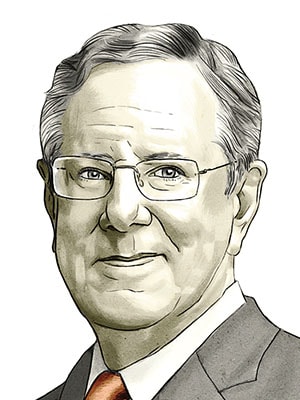
The Federal Reserve May Finally Stop Poisoning the Economy
The US central bank may stop buying bonds. And that is a good thing
The Federal Reserve is giving a tiny indication that it might back off from its massive bond-buying programme. Whenever such an action is hinted at, the stock market initially reacts adversely.
Equities should do the opposite. Contrary to myth, the Fed’s actions since early 2009 have damaged the economy. This wasn’t intentional, obviously. Doctors who harmed their patients with their toxic brews and incessant bleeding 150 years ago were also motivated by a desire to do good.
Eminent economists David Malpass and John Taylor, among others, have pointed out how the Fed’s zero-interest-rate policy has badly skewed our credit markets, thereby blocking, not stimulating, economic growth. The winners of this policy: Large companies, which get globs of cheap credit; so-called government-sponsored enterprises, ie, Fannie Mae and Freddie Mac, which have benefited from the Fed’s purchasing boatloads of mortgage-backed securities (these two entities are once again coining money); the federal government, which runs up deficits at virtually no cost (deficits without tears); commercial banks, which get a nice piece of change by depositing Fed-created excess reserves at the central bank and earning interest on those deposits; and bond underwriters and traders. But smaller businesses have suffered from inadequate credit, and the uncertainty of credit availability has damaged job creation, since smaller entities are the big job producers.
Two other unintended victims of the Fed’s actions are life and property/casualty insurance companies. Heavily regulated insurers invest most of their available cash in high-rated fixed-income instruments, including, of course, Treasurys. But with interest rates suppressed, mutual life insurers have had to sharply curtail the traditional growth of dividends to long-term policyholders.
Property/casualty underwriters are suffering even more. For decades these entities have paid out more in losses than they’ve taken in in premiums, with the gap being made up by investment income. But the Fed’s zero-interest-rate policy has put these companies in a bind. Their historical book yield—the net investment income as a percentage of average net invested assets—is falling. But expenses are rising.
It never occurred to Ben Bernanke that he was setting the stage for much higher insurance premiums, which won’t help the economy. Forbes Insights, our custom research arm, in association with AIG, conducted a study on the pressure the property/casualty insurance market is experiencing, particularly as a result of low investment returns.
Savers, of course, have been punished. Millions of the elderly have traditionally received a good part of their retirement income from interest on bank CDs, which now offer microscopic yields. Our central bank is continually hailed for “doing its part” to help the economy, while the rest of Washington flounders. But the reality is contrary and ugly: The Fed’s policies have hurt capital creation and inhibited productive investment by distorting credit markets, a critical reason that this recovery is the most feeble in US history.
It’s amazing that Democrats, in particular, throw rose petals at Bernanke’s feet for practising what liberals always—and falsely—accuse Republicans of: Trickle-down economics. Bernanke wants high stock and bond prices to create a “wealth effect” that will trigger investment, which will, in turn, trickle down to the masses via greater economic growth.
President Obama, in a rude and crude manner, let it be known in an interview with Charlie Rose that Bernanke would be dumped at the end of his term, which expires in January. Alas, Bernanke’s replacement will likely have even less understanding of central banking than Bernanke has.
Steve Forbes is Editor-in-Chief, Forbes USA
(This story appears in the 30 November, -0001 issue of Forbes India. To visit our Archives, click here.)






